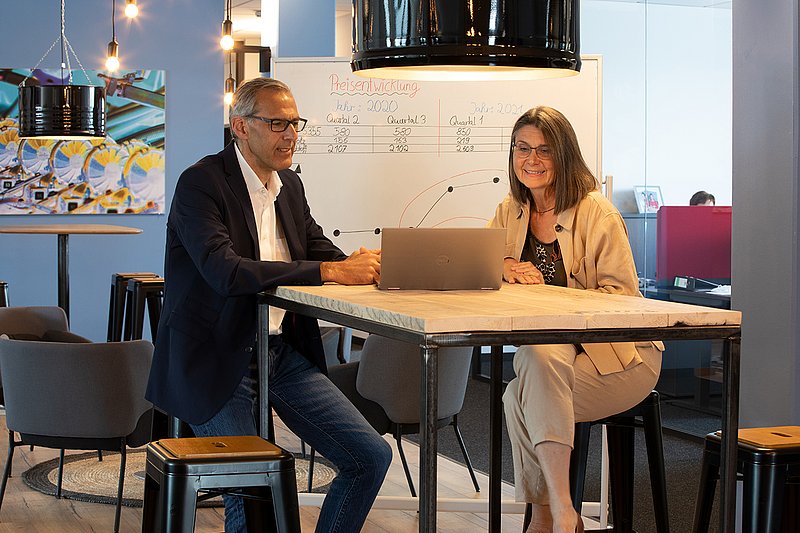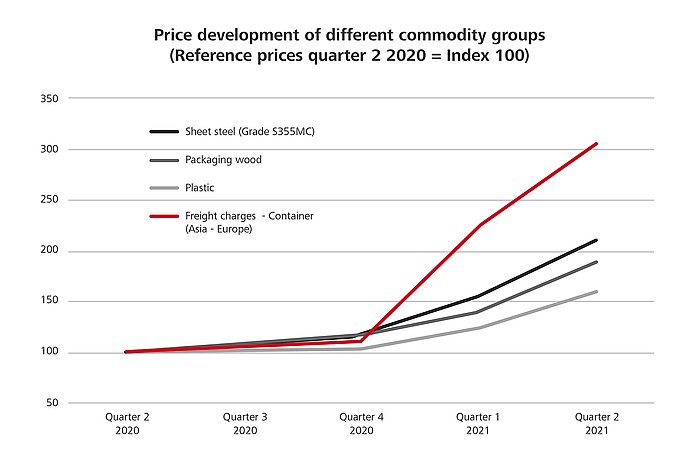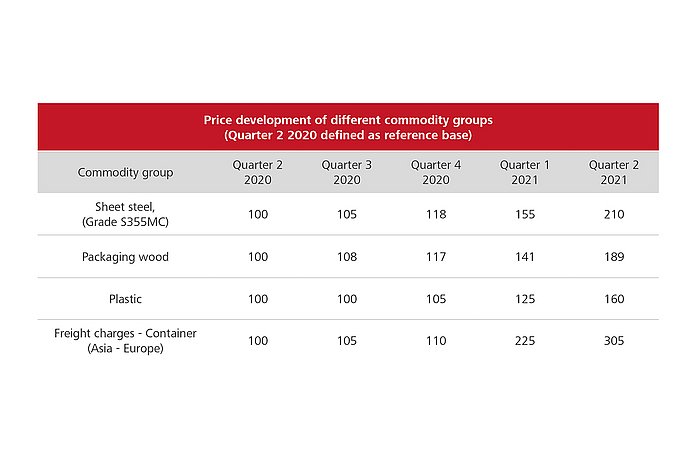Consequences of raw material scarcity
The current tense market und purchasing situation is influenced by different factors and is not only caused by Covid-19 but also by changing delivery times, price increases for raw materials and freights, an increased demand as well as low capacities in the market. This is particularly true for the engineering and automotive manufacturing sector. The current situation also affects the HORSCH Maschinen GmbH.
The steel price per ton has almost doubled. There are supply bottlenecks, some steel grades are even sold out. Empty warehouses add to the increasing costs. “We thought the peak would be reached in February or March. But the situation still is critical”, Dr. Johann Neidl, Purchasing and Digitalization, comments. There were similar price increases in 2008. However, the situation improved after five to six months. Supply difficulties of other countries affect the whole delivery chain. If, in addition, production sites have to be shut down because of the weather or, as in Taiwan or China, because of fires, it upsets the whole market and affects the delivery times. “When before the delivery time was 10 to 15 weeks, it now partly is 30 weeks. And we unfortunately pass this on in the chain“, Neidl says.

Other commodity groups are affected, too. Copper and aluminium prices also doubled, wood prices even tripled. At the same time, these groups, too, suffer from supply problems. Electronic components and plastics are becoming scarce. It partly is the primary material that is missing, but the supply lags behind the demand. There also are kind of hoarding purchases despite the high prices. This increases the demand and thus the costs. To attenuate the existence-threatening situation for the suppliers, HORSCH tries to counteract with long-term contracts, long-term partnerships and bundle purchases. “We take a close look at each supplier and try to define how we can support him respectively how we can grant price concessions to manage the partnership and the balance“, Neidl explains.
To be able to meet delivery times, complete and deliver machines, the company reorganised the employees in the production department. Hiring temporary worker is to ease the situation even more. This caused new challenges for the employees, e. g. language barriers among the colleagues. But the problem could always be solved as the employees supported each other. “We had to make sure that the new colleagues were trained as quickly as possible. This was an additional burden for the employees and the HR department which was responsible for the recruitment. Another problem was that we did not know if our Czech employees were allowed to cross the frontier. Still all employees were working tirelessly. Although the time was rather challenging for everyone, they all pulled together to find a solution”, Cornelia Horsch, managing director at HORSCH, comments.
Increasing boom in Asia
One aspect of the current supply deficit is the increasing boom in Asia. In the first quarter of 2021 they achieved a two-digit economic growth. Due to the high domestic requirements only small amounts of steel is delivered from Asia to Europe.
Another problem is that production had been reduced for two to three months before economy restarted in a disproportionate way. The situation also affects the freight charges. The average prices for containers or air freight flights have quadrupled. To guarantee the security of supply, air freight is still used to a great extent.
Despite the continuing difficult market situation, the turnover of the manufacturers in Europe has reached the same level as before the pandemic. Especially due to the increased demand in Asia. Governmental subsidy programs provide money which is spent and increases consumption. “Economy is doing well across all sectors. In most countries Corona did not have a strong impact as the negative effects were compensated for by high subsidies in many sectores”, Neidl says. At HORSCH the employees significantly contributed to the growth of the company during the pandemic. “As you can see, it worked very well and we are proud to have employees who are this committed, contribute new ideas and are ready to take unusual paths”, Cornelia Horsch points out.
Mobile workplaces
Right at the beginning of the pandemic HORSCH set up mobile workplaces so that the employees would be more flexible with regard to their place of work. This also was an enormous effort. “Not all the existing workplaces were equipped accordingly. This tied up capacity in our IT department. But we wanted to react fast as the child-care facilities were closed and a lot of parents had to work from home. For our IT department it was a matter of course to invest quite some additional work and to provide digital solutions and the necessary equipment to quickly make mobile working possible”, Cornelia Horsch says. It was an additional burden that some employees were trained to carry out Corona tests. “We decided quite early that we wanted to offer our employees the possibility to get tested on the premises to protect the safety and the health of every single one”, she explains. The test stations were set up at the different sites at the beginning of the year. The marketing and sales department, too, were reorganised. But for Cornelia Horsch this had a positive effect: “We restructured our marketing strategy and now we are working with a lot of media that we had not used to such an extent before.” “It pushed digitalisation. We work online a lot, the way of exchange has changed, but has become more flexible“, Michael Braun, Sales Support, adds. The employees actively supported the changes within the company by flexibly adapting and helping to shape the new communication channels. “Precisely because our employees were this open and supported the changes in such a committed way, these new media today are a natural part of our everyday working life. And we are very happy about it“, Cornelia Horsch says.
Due to a very good increase in sales HORSCH was able to raise the salaries and recruit new employees. “We still have not reduced the number of temporary workers as we have not yet been able to catch up due to the leap in growth. We hope that we will soon be able to compensate that”, Cornelia Horsch says. The company also tries to keep the prices for the customers within reasonable limits. “The price increase for 2021 we fixed last autumn was only moderate as we assumed that the prices for components would not increase dramatically. However, we had to react in spring and adjust the prices upwards”, Cornelia Horsch explains. “In the environment described above we tried to keep the costs and the prices for our customers within reasonable limits”, Neidl says.
How the situation will develop depends on different circumstances, among others on how the pandemic will change. The company expects that the current situation will continue to be on this level, with a tendency to soften a little bit. “But we are very sure that together we will get through this time. We notice an even greater team spirit than before. We have great, motivated and loyal employees who were ready to do extra work and thus, of course, also accepted more stress. We, the managing directors, definitely notice this and we are very grateful. For we know that it has not always been easy and meant quite a lot of effort for everyone”, Cornelia Horsch emphasises.

